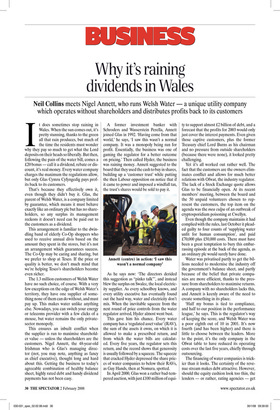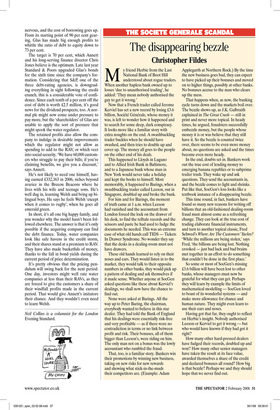Why it’s raining dividends in Wales
Neil Collins meets Nigel Annett, who runs Welsh Water — a unique utility company which operates without shareholders and distributes profits back to its customers It does sometimes stop raining in Wales. When the sun comes out, it’s pretty stunning, thanks to the green all that rain produces, but much of the time the residents must wonder why they pay so much to get what the Lord deposits on their heads so liberally. But then, following the pain of the water bill, comes a £20 bonus — call it a dividend, rebate or discount, it’s real money. Every water company charges the maximum the regulations allow, but only Glas Cymru Cyfyngedig pays profits back to its customers.
That’s because they effectively own it, even though they didn’t buy it. Glas, the parent of Welsh Water, is a company limited by guarantee, which means it must behave exactly like an ordinary plc but has no shareholders, so any surplus its management reckons it doesn’t need can be paid out to the customers as a dividend.
This arrangement is familiar to the dwindling band of elderly Co-Op shoppers who used to receive annual divis based on the amount they spent in the stores, but it’s not an arrangement which guarantees success. The Co-Op may be caring and sharing, but we prefer to shop at Tesco. If the price or quality is better, we don’t much mind that we’re helping Tesco’s shareholders become even richer.
The 1.3 million customers of Welsh Water have no such choice, of course. With a very few exceptions on the edge of Welsh Water’s territory, they have one supplier of something none of them can do without, and must pay up. This makes water unlike anything else. Nowadays, you can switch your energy or telecoms provider with a few clicks of a mouse, but water remains the only privatesector monopoly.
This ensures an inbuilt conflict when the supplier is run to maximise shareholder value — unless the shareholders are the customers. Nigel Annett, the 48-year-old Irishman who is Glas’s managing director (not, you may note, anything as fancy as chief executive), thought long and hard about this. Getting the business to today’s agreeable combination of healthy balance sheet, highly rated debt and handy dividend payments has not been easy. A former investment banker with Schroders and Wasserstein Perella, Annett joined Glas in 1992. ‘Having come from that world,’ he says, ‘I saw this wasn’t a normal company. It was a monopoly being run for profit. Essentially, the business was one of gaming the regulator for a better outcome on pricing.’ Then called Hyder, the business was raining money. Annett suggested to the board that they used the cash to buy in shares, building up a ‘customer trust’ while putting the then Labour opposition on notice that if it came to power and imposed a windfall tax, the trust’s shares would be sold to pay it.
As he says now: ‘The directors derided this suggestion as “pinko talk”’, and instead blew the surplus on Swalec, the local electricity supplier. As every schoolboy knows, and every utility executive has eventually found out the hard way, water and electricity don’t mix. When the inevitable squeeze from the next round of price controls from the water regulator arrived, Hyder almost went bust.
This gave him his chance. Every water company has a ‘regulated asset value’ (RAV), the sum of the assets it owns, on which it is allowed to make a prescribed return, and from which the water bills are calculated. Every five years, the regulator sets this return, and the record shows that generosity is usually followed by a squeeze. The squeeze that cracked Hyder depressed the share prices of water companies to below their RAVs, as Guy Hands, then at Nomura, spotted.
In April 2000, Glas won a rather bad-tempered auction, with just £100 million of equi ty to support almost £2 billion of debt, and a forecast that the profits for 2003 would only just cover the interest payments. Even given those captive customers, plus the former Treasury chief Lord Burns as his chairman and no pressure from outside shareholders (because there were none), it looked pretty challenging.
Yet it’s all worked out rather well. The fact that the customers are the owners eliminates conflict and allows for much better relations with Ofwat, the industry regulator. The lack of a Stock Exchange quote allows Glas to be financially open. At its recent members’ meeting, between the board and the 50 unpaid volunteers chosen to represent the customers, the top item on the agenda was the mea culpa of an outbreak of cryptosporidium poisoning at Cwellyn.
Even though the company maintains it had complied with the rules, last October it pleaded guilty to four counts of ‘supplying water unfit for human consumption’, and paid £70,000 plus £50,000 costs. There must have been a great temptation to bury this embarrassing episode at the back of the agenda, as an ordinary plc would surely have done.
Water was privatised partly to get the billions needed to modernise the industry off the government’s balance sheet, and partly because of the belief that private companies are more efficient, thanks to the pressure from shareholders to maximise returns. A company with no shareholders lacks this, and Annett is keenly aware of the need to create something in its place.
‘Half my bonus is tied to compliance, and half to our position in the performance league,’ he says. This is the regulator’s way of keeping the score, and Welsh Water was a poor eighth out of 10 in 2001. It’s now fourth (and has been higher) and there is little to choose between the leaders. More to the point, it’s the only company in the Ofwat table to have reduced its operating costs over the last five years, chiefly through outsourcing.
The financing of water companies is trickier than it looks. The certainty of the revenue stream makes debt attractive. However, should the equity cushion look too thin, the lenders — or rather, rating agencies — get nervous, and the cost of borrowing goes up. From its starting point of 90 per cent gearing, Glas has made big enough profits to whittle the ratio of debt to equity down to 73 per cent.
The target is 70 per cent, which Annett and his long-serving finance director Chris Jones believe is the optimum. Late last year Standard & Poors upgraded Glas’s bonds for the sixth time since the company’s formation. Considering that S&P, one of the three debt-rating agencies, is downgrading everything in sight following the credit crunch, this is a considerable vote of confidence. Since each tenth of a per cent off the cost of debt is worth £2.5 million, it’s good news for the dividend prospects, too. A normal plc might now come under pressure to pay more, but the ‘shareholders’ of Glas are unable to apply the sort of pressure that might spook the water regulator.
The retained profits also allow the company to indulge in desirable improvements which the regulator might not allow as spending to add to the RAV, or which veer into social security. ‘We have 60,000 customers who struggle to pay their bills; if you’re claiming benefits, we give you a discount,’ says Annett.
He’s not likely to need one himself, having earned £332,363 in 2006, riches beyond avarice in the Brecon Beacons where he lives with his wife and teenage sons. He’s well dug in, learning Welsh and bring up bilingual boys. He says he feels Welsh ‘except when it comes to rugby’, when he goes all emerald green.
In short, it’s all one big happy family, and you wonder why the model hasn’t been followed elsewhere. The answer is that it’s only possible if the acquiring company can find the debt finance. Today, water companies look like safe havens in the credit storm, and their shares stand at a premium to RAV. They have also made bucketfuls of money, thanks to the fall in bond yields during the current period of price determination.
It’s pretty obvious that the pricing pendulum will swing back for the next period. One day, investors might well rate water companies at less than their RAVs, as they are forced to give the customers a share of their windfall profits made in the current period. That would give Annett’s imitators their chance. And they wouldn’t even need to learn Welsh.



































































 Previous page
Previous page